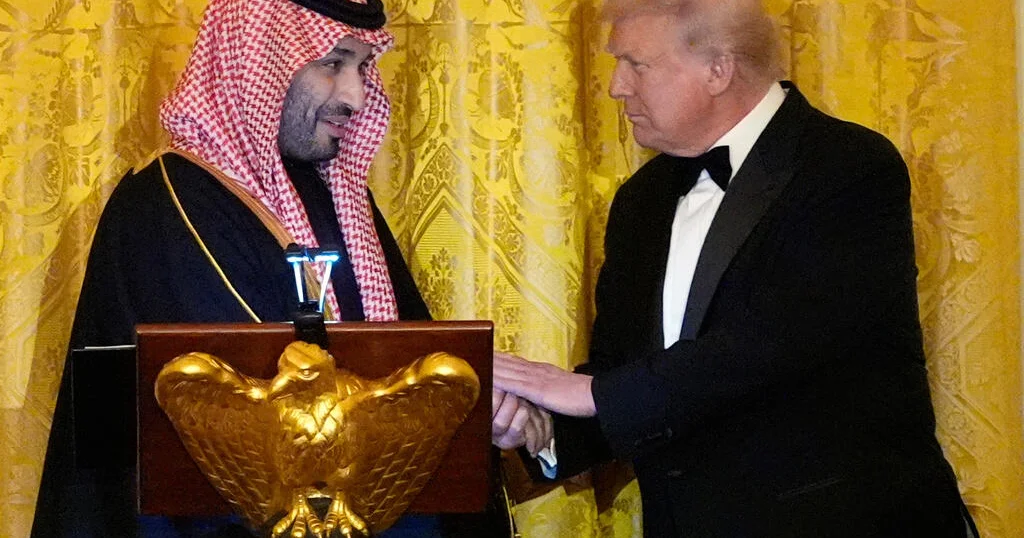In a significant shift in defense relations, President Trump announced he will officially designate Saudi Arabia as a major non-NATO ally during a recent dinner at the White House, honoring Saudi Crown Prince Mohammed bin Salman. This move, which comes after the signing of a strategic defense deal earlier in the day, paves the way for enhanced military cooperation and reflects a long-standing partnership between the U.S. and Saudi Arabia. This designation opens up new avenues for collaboration, including access to U.S.-manufactured military equipment, further solidifying the two nations’ ties.
| Article Subheadings |
|---|
| 1) Strengthening Defense Ties with Saudi Arabia |
| 2) Historical Context of U.S.-Saudi Relations |
| 3) Military and Economic Cooperation on the Rise |
| 4) The Abraham Accords and Saudi Arabia’s Position |
| 5) Human Rights Concerns in the Partnership |
Strengthening Defense Ties with Saudi Arabia
During a formal dinner attended by dignitaries and officials, President Trump highlighted the U.S. intention to designate Saudi Arabia as a major non-NATO ally. This classification is regarded as a pivotal step in enhancing defense ties between the two nations. Trump emphasized that this development would elevate military collaborations to “even greater heights.” The formal announcement took place alongside the signing of a new strategic defense agreement, where both leaders underscored their commitment to strengthening security frameworks that address shared geopolitical challenges in the region.
Historical Context of U.S.-Saudi Relations
The partnership between the United States and Saudi Arabia spans over eight decades, tracing back to a pivotal meeting between King Abdulaziz Ibn Saud and former President Franklin Delano Roosevelt in 1945. This historic connection laid the groundwork for ongoing cooperation in various sectors, including defense. Over the years, mutual interests, particularly a shared rivalry with Iran, have solidified this alliance. Understanding this historical backdrop is vital when analyzing current events as it contextualizes the long-standing nature of U.S. support for Saudi Arabia and its strategic importance in Middle Eastern geopolitics.
Military and Economic Cooperation on the Rise
At the core of the recent discussions, which were marked by elaborate White House ceremonies and a military flyover, was a commitment from Saudi Arabia to expand its military capabilities. The deal encompasses significant purchases, including hundreds of tanks and advanced weaponry, indicating a substantial investment in defense infrastructure. Moreover, discussions for cooperative ventures in artificial intelligence and civil nuclear energy further reflect the growing defense and economic synergy between the two nations. Crown Prince Mohammed bin Salman announced an investment pledge in the U.S. that has risen dramatically, showcasing the financial aspect of the relations. This evolving partnership not only enhances military capabilities but also potentially expands economic ties between the countries.
The Abraham Accords and Saudi Arabia’s Position
One significant topic of conversation was Saudi Arabia’s potential involvement in the Abraham Accords, a series of diplomatic agreements facilitated by Trump that aim to normalize relationships between Israel and several Arab nations. During the Oval Office event, Crown Prince Mohammed bin Salman expressed interest in joining the accords but emphasized the need for a recognized path toward a Palestinian state. These remarks indicate a cautious approach; while Saudi Arabia shows interest, it remains influenced by regional realities and commitments to the Palestinian cause. Trump’s optimistic assertions suggest that Saudi Arabia may eventually align itself with the broader goals of the accords, positioning the kingdom in a transformative role in regional diplomacy.
Human Rights Concerns in the Partnership
Despite the strategic benefits that accompany the U.S.-Saudi alliance, human rights issues remain contentious. Particularly, the involvement of Crown Prince Mohammed bin Salman in high-profile cases, such as the assassination of journalist Jamal Khashoggi, has drawn international scrutiny. American intelligence agencies determined that bin Salman had approved the operation that led to Khashoggi’s death, creating a complex dilemma for U.S. officials who wish to bolster relations without compromising on human rights standards. While Trump defended bin Salman by suggesting he was unaware of the operation, the ongoing discussions highlight the challenges that arise in balancing diplomatic interests with ethical considerations.
| No. | Key Points |
|---|---|
| 1 | President Trump will designate Saudi Arabia as a major non-NATO ally. |
| 2 | This partnership signifies enhanced military collaboration between the U.S. and Saudi Arabia. |
| 3 | Historical ties date back to 1945, influenced by shared interests, especially in regard to Iran. |
| 4 | Saudi Arabia’s investment in U.S. military and economic sectors continues to grow, alongside strategic defense agreements. |
| 5 | Human rights concerns complicate the relationship, particularly regarding Crown Prince Mohammed bin Salman’s alleged involvement in the Khashoggi case. |
Summary
The recent announcement by President Trump to designate Saudi Arabia as a major non-NATO ally underscores the escalating defense ties between the two nations. As they navigate military and economic partnerships, historical context, regional challenges, and human rights concerns will play pivotal roles in shaping future interactions. This news not only reflects the intricacies of geopolitical relationships but also serves as a reminder of the balancing act required to maintain alliances while addressing ethical considerations.
Frequently Asked Questions
Question: What does it mean for Saudi Arabia to be designated a major non-NATO ally?
The designation allows Saudi Arabia to collaborate more closely with the U.S. military, providing easier access to American military equipment and potentially enhancing defense cooperation.
Question: How long has the U.S.-Saudi partnership been established?
The U.S.-Saudi partnership has existed for over 80 years, dating back to a meeting between King Abdulaziz Ibn Saud and President Franklin Delano Roosevelt in 1945.
Question: What are the implications of the Abraham Accords for Saudi Arabia?
The Abraham Accords provide a framework for normalizing relations between Israel and several Arab states. Saudi Arabia’s potential involvement could play a crucial role in reshaping regional dynamics and furthering peace discussions, particularly concerning the Palestinian statehood issue.


